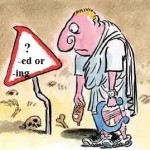Some adjectives have two forms depending on whether a person is 
being affected by something (e.g.: I was frightened by the look in her eyes.)
or whether a person or thing is having an effect on somebody or something
(e.g.: She is very frightening when she is angry.)
A thing can only be described with the –ing form (e.g.: the film is interesting)
because a thing cannot be affected by anything. Only people can be described
by both –ing and –ed adjectives.
Exercise 1: Fill in the blanks with the correct form of the adjective. The base verbal forms are given in brackets.
- People who talk about politics all the time are ………………… . (bore)
- When he realized what a fool he has made of himself, he felt terribly ……………… . (embarrass)
- Don’t go to that restaurant – the food is ………………. (revolt).
- The film was so ………………. (move) that she cried at the end.
- Looking after children all day long is very ………………. . (tire)
- By the evening I am completely ……………………. . (exhaust)
- The scenery in the Alps is absolutely ………………. . (amaze)
Exercise 2: Right or wrong? Where necessary, change the form of the adjective(s) in the sentences.
- The boy is really annoyed – he is always losing his things.
- He has heard some worried news about possible redundancies at work.
- After a relaxed bath, she felt refreshing.
- The theme park was really disappointing.
- There was only one ride which the children thought was really frightened.
- My job is challenging, but it has bored moments, too.
- Some of the exam results were disappointed, but on the whole, I am satisfying with the students’ progress.
Answer key:
Exercise 1:
- boring, 2. embarrassed, 3. revolting, 4. moving, 5. tiring, 6. exhausted, 7. amazing
Exercise 2:
- wrong, annoying, 2. wrong, worrying, 3. wrong, relaxing, wrong, refreshed, 4. right, 5. wrong, frightening, 6. right; wrong, boring, 7. wrong, disappointing; wrong, satisfied
